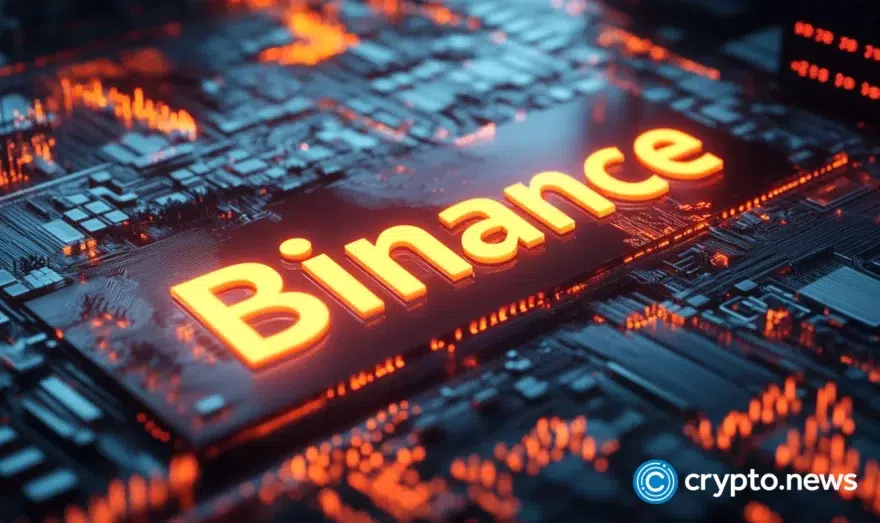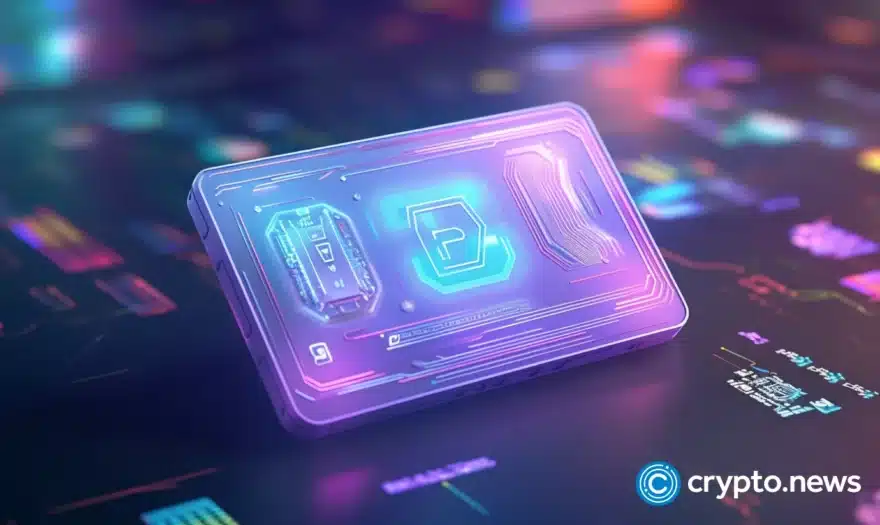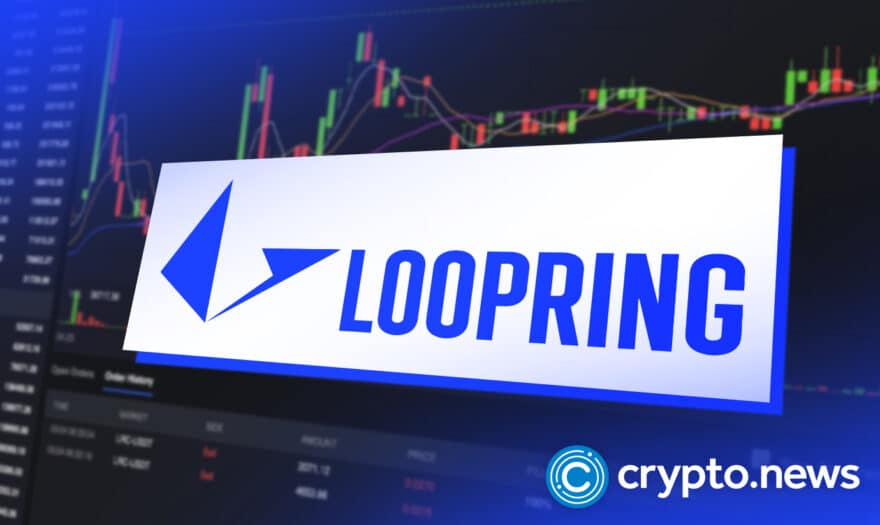Loopring Price
Loopring to USD price Chart
Loopring price today
The current price of Loopring (LRC) is $0.0348121, as of Feb 13, 2026. Over the last 24 hours, the price has moved by -8.68%, with a change of 0.37% in the past hour. For longer-term performance, the price has varied by -11.64% over the last 7 days and by -37.41% in the past month.
Market update
The 24-hour trading volume is $21,238,158, and price fluctuations during this time have ranged between a low of $0.032853 and a high of $0.0387276. The all-time high for Loopring was $3.75 on Nov 10, 2021, while the all-time low was $0.0196389 on Dec 18, 2019.
Market ranking and capitalization
Loopring holds a market rank of #496, with a market capitalization of $43,392,724. Its fully diluted valuation stands at $47,846,322.
Supply overview
The circulating supply of Loopring is $1,245,991,469, out of a total supply of $1,373,873,397 and a maximum supply of $1,374,513,896.
Price changes and historical data
Over the last year, Loopring has experienced a price shift of -72.9%, while over the last 30 days, the price has seen a -37.41% change. The price change over the last 200 days stands at -61.64%.
These metrics are updated every minute to ensure real-time accuracy, helping you stay informed about the latest trends and market movements for Loopring.
What is Loopring (LRC)?
Loopring (LRC) is a layer-2 (L2) protocol built on top of Ethereum (ETH), and it is designed to increase the speed and security of decentralized crypto exchanges (DEXs). The protocol combines centralized order matching with decentralized on-chain settlement via a proprietary technology known as zkRollup. Loopring enables users to trade and transfer assets without relying on intermediaries, benefiting from quick, low-cost transactions.
It’s also a platform for developers to build payment apps, non-fungible token (NFT) marketplaces, and other applications that use its L2 infrastructure. Additionally, Loopring is a payment app allowing users to move ETH and ERC20 tokens to any Ethereum address.
The platform has a native token called LRC, which became available in August 2017, two years before the Loopring protocol was deployed on Ethereum.
Who are the founders of Loopring?
The Loopring Foundation, the Loopring protocol’s parent organization, was founded by Shanghai-based software engineer and businessman Daniel Wang.
Wang, who’s also the foundation’s CEO, was once the lead software engineer at Boston Scientific. He also worked for Google and JD.com.
In addition to Loopring, Wang co-founded several businesses, including Coinport Technology and Yunrang Information Technology Ltd.
What makes Loopring unique?
Loopring’s most significant selling point is its combination of the best features of centralized and decentralized exchanges. The protocol also leverages xkRollup technology to scale ETH transactions and reduce gas fees.
Centralized exchanges (CEXs) often risk losing customers’ funds due to cyberattacks, fraud, or regulatory interference. On the other hand, decentralized exchanges are less efficient and often have limited capabilities compared to CEXs.
Loopring has adopted a hybrid approach, where it manages orders in a centralized style like a CEX but settles trades on-chain and combines multiple orders into circular trades like a DEX.
In this way, the LRC protocol aims to preserve the strengths of both types of exchanges while lowering or eliminating their inefficiencies.
How is the Loopring network secured?
A combination of cryptography and economic incentives secures the Loopring network.
Cryptographic proofs ensure that every transaction on the network is valid and authorized by the users and that no funds can be stolen or double-spent.
At the same time, economic incentives align the interests of the network participants, such as relayers, verifiers, and liquidity providers, to maintain the security and efficiency of the network.
Loopring is also available on Neo and Ethereum, with each network having its own coin: an LRN and an LRC coin. Each network’s underlying hash functions safeguard the tokens: Ethash for LRC and RIPEMD160 for LRN.
LRC price information
The Loopring coin is an essential component of the Loopring network since it’s used for transaction fees and staking.
The Loopring price now is $0.0348121 as of Feb 13, 2026. The LRC market cap currently stands at $43,392,724.
How to buy Loopring
To buy the Loopring coin, you need to have some ETH in your wallet and use a platform that supports Loopring trading.
You can use Loopring’s layer-2 app or other exchanges, such as Binance, Bilaxy, or OKX, to buy Loopring with ETH.
Alternatively, you can swap other tokens for Loopring crypto using decentralized exchanges like Uniswap or 1inch.
How to use the Loopring DEX
To use Loopring, you need to do the following:
First, connect your wallet to the Loopring web or mobile app. You can use MetaMask, WalletConnect, Coinbase Wallet, or other supported wallets.
Next, deposit your crypto into the Loopring L2 account. It will require a one-time ETH transaction fee and a signature from your wallet.
After you are done, you can start trading on the Loopring order book or swap interface.
As mentioned earlier, Loopring is also a payment platform that you can use to settle frequent payments to many people, regardless of whether or not they have previously used the DEX. All you need is the intended recipient’s Ethereum address or ENS name, the crypto asset, and the quantity to be sent.
After trading on the DEX, you can withdraw your crypto back to your wallet. It will also require a signature from your wallet and a waiting period of up to 15 minutes.
What are the fees incurred from using Loopring DEX?
Per its official website, Loopring has reduced transaction charges to 1/30–1/100 of the fees on the Ethereum mainnet.
There are several fees associated with using the Loopring DEX. For instance, users will pay a registration fee of 0.0001 ETH plus a gas fee.
There’s a 0.0001 ETH fee for deposits and a 0.002 ETH fee for withdrawals.
FAQs
Can I stake LRC?
Yes, you can stake LRC on the Loopring web app or the Loopring Wallet app through the Loopring protocol. Staking allows you to be part of the network’s consensus mechanism and earn rewards after locking your LRC tokens for 90 days.
The rewards are calculated daily based on the protocol fee amount from the previous day and then distributed among stakers based on their contribution. You can contribute to the liquidity and overall Loopring exchange ecosystem efficiency through staking.
What is Loopring used for?
Loopring (LRC) is a layer-2 protocol on the Ethereum blockchain used to speed up and secure decentralized crypto exchanges (DEXs). It employs a unique technology, zkRollup, merging centralized order matching with decentralized on-chain settlement. Loopring facilitates quick, inexpensive transactions and allows users to trade and transfer assets without intermediaries.
Also, developers can use Loopring’s infrastructure to create payment apps, non-fungible token (NFT) marketplaces, and other applications. It’s also a payment app permitting users to transfer ETH and ERC-20 tokens to any Ethereum address.
What are the advantages of using Loopring?
According to Loopring, it has many advantages that make it stand out and set itself apart from traditional centralized exchanges and other decentralized exchanges. Some of these advantages are:
Off-chain order management and on-chain settlement ensure that performance is not sacrificed for security.
Greater liquidity due to ring-mining and order sharing.
Faster transactions due to the establishment of a “fast lane” through the use of zkRollups
Dual authoring eliminates the problem of front running that all DEXs and their users experience today.
Any dApp can build or interact with the protocol thanks to the availability of free, public smart contracts.
Operator standardization promotes network effects and enhances the user experience.
Lower entry barriers translate into reduced costs for nodes and end users joining the network.
How fast are Loopring transactions?
According to the protocol’s developers, Loopring is 1,000 times greater than Ethereum, with 2,025 transactions per second. This is because the protocol’s transactions settle on Layer 2, creating near-instant confirmations and a seamless trading experience. This design aims to ensure users can execute trades quickly and benefit from market opportunities.
Can I use Loopring with other blockchains?
Yes, Loopring can be used with other blockchains. Despite Loopring mainly operating on the Ethereum blockchain, it is blockchain agnostic and can be deployed on any blockchain with smart contract functionality.
How does Loopring ensure liquidity for trading?
Loopring is a decentralized platform that integrates different cryptocurrency exchanges and blockchains. It enhances liquidity using its unique order rings and order-sharing processes. Essentially, it’s able to fragment larger orders into smaller ones, which are then spread across multiple trading venues simultaneously. This allows users to tap into more liquidity than what is solely available in the market.
How does Loopring address scalability challenges in decentralized exchanges?
How does Loopring overcome scalability issues present in decentralized exchanges? Loopring tackles scalability problems by deploying a technology known as Zero-Knowledge Proofs, specifically a variation called zkRollups. In simple terms, zkRollups allow a system to claim a dataset without sharing it.
By grouping numerous transactions into a single proof and then posting this proof to the Ethereum blockchain, Loopring substantially minimizes the number of on-chain operations required for each trade. This move helps to reduce congestion on the Ethereum network. It also allows Loopring to achieve high transaction throughput, offering a scalable exchange solution.
LRC Price Statistics
| Loopring Price | $0.0348121 |
|---|---|
| Price Change 24h | -8.68% |
| Price Change 7d | -11.64% |
| Trading Volume 24h | $21,238,158 |
| 24H Low | $0.032853 |
| 24H High | $0.0387276 |
Loopring Market Cap
| Market Cap Rank | #496 |
|---|---|
| Market Cap | $43,392,724 -8.65% |
| Fully Diluted Valuation | $47,846,322 |
Loopring Price History
| All-Time High Nov 10, 2021 | $3.75 -99.08% |
|---|---|
| All-Time Low Dec 18, 2019 | $0.0196389 76.39% |
Loopring Supply
| Circulating Supply | $1,245,991,469 |
|---|---|
| Max Supply | $1,374,513,896 |
| Total Supply | $1,373,873,397 |
Latest Loopring News




